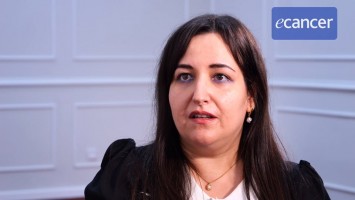I actually work with an under-served population in the United States and I deal with the inequities of healthcare in the United States but I am very aware of the vast differences in healthcare opportunities for people all over the world. So I’m here at AORTIC to learn about different opportunities to learn from each other and to help try to erase some of the inequities.
I’ve already learned some very interesting things. Morocco is a wonderful place for them to have the conference this year because, as far as on the African continent, Morocco, especially the efforts of the Princess, have pushed forward the women’s healthcare agenda, specifically related to cervix cancer which is a totally preventable disease and one that I see way too much of even in Houston in the United States. So I’m very impressed with what’s happened and I’m very interested in learning how to prevent a disease that could be wiped off the planet with the HPV vaccine. Although that hopefully will be a thing of the past, the cancer in general, right now we have to deal with the palliative care of those who have the cancer as well as new solutions for people in Africa who may not have access to standard of care which is chemotherapy and radiation for locally advanced cancers. That was one of my talks and whereas I mentioned neoadjuvant chemotherapy for cervix cancer may be considered inappropriate in certain situations, in areas and in countries where there is no radiation available it is an incredibly important aspect of care. So we discussed neoadjuvant chemotherapy for cervical cancer. I also discussed it in terms of when you have to triage your resources. Whereas patients with earlier stage locally advanced cervical cancer may benefit greatly from chemotherapy with radiation, those with much more advanced cervix cancer may not benefit as much. So if resources are scarce learning how to triage. One of the things that I found as I even prepared for this is that we often use that chemotherapy without even thinking where we have access to it. Sometimes where scarce resources make you impoverished, too many resources make you obese and unhealthy as well.
Are there lessons you’ve learned from the US experience that can be applied to Africa and vice versa?
I have learned a lot more about the application of middle level providers, especially in how they’re used in outreach in Morocco for cervical cancer screening. Although we have Pap smears and HPV DNA tests in America, I still see quite a few patients who are not screened and present with large cancers. I learned about being more creative; today we talked about inequities at our conference this morning with Lynn Denny and Dr Shankar about how some countries have even accessed industry, like the Coca Cola company, to deliver drugs because they were heading in that direction.
We have a programme at MD Anderson that involves ECHO mentoring and although it’s kind of like teleconferencing it’s really telementoring and we are developing collaborations where we can talk about difficult cases with each other and develop more outreach in those areas. And although all of the people here are very motivated from their hearts to try to make things better, we really need the governments to recognise that it is totally unacceptable to not have a radiation facility within your country. Then in countries that can get the HPV vaccine it’s totally unacceptable not to be providing that. I wish that all of us could just get up and scream and say, ‘This is ridiculous. This is ridiculous that you are not providing radiation facilities or prevention care for your citizens.’
Is financing the main barrier or are there other factors at play?
Even in the United States we have our share of issues. We are only vaccinating our girls with all three shots, about 30-40% of our girls are fully vaccinated in comparison to Rwanda which had a beautiful programme that vaccinated ninety-something percent of their girls and hopefully we’ll see great results from that. Issues of distribution, I think there’s also confusion about who was supposed to get it. Fortunately we are learning that HPV doesn’t only cause cervix cancer, we are learning that it causes oropharyngeal cancer in men, usually in the 55 year old age group and there’s no screening tests for it. Although I think it’s unfortunate that we found another cancer related to HPV, I hope that that alone will help raise awareness for how the Pap smear won’t work for men so we need to vaccinate to prevent it. Other issues that might be related are the confusion related to the vaccine: there was one vaccine, then there was two, now there are three, there are three different vaccines that cover three different groups with some overlap, and when you give it and how many times you give it and hopefully we’ll move over the next few years to one vaccine with hopefully less than three shots.
My interest is really cervix cancer because I think, more than any other cancer, it is the example of inequities in personal health education, in access to healthcare, in insurance in the United States, in medical literacy, in prevention. More than anything else, I think cervix cancer, which unfortunately is overabundant in Africa, is the way to move forward.








